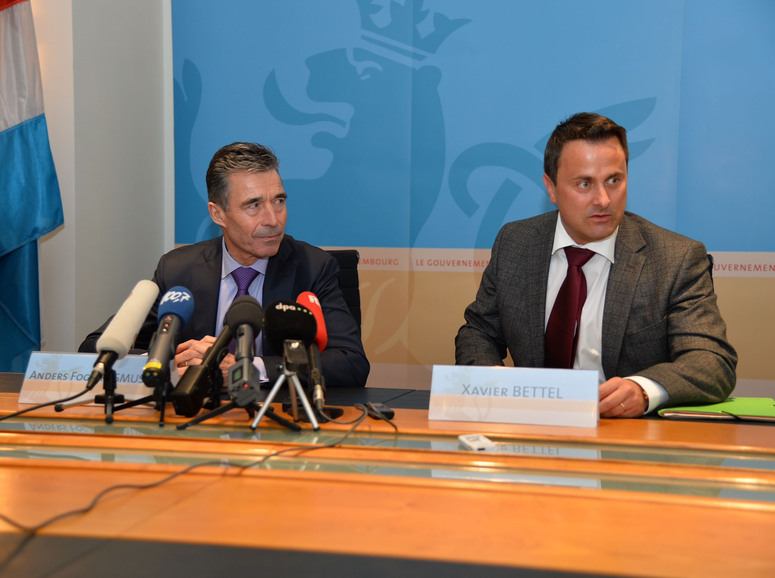Joint press point
with NATO Secretary General Anders Fogh Rasmussen and the Prime Minister of Luxembourg, Xavier Bettel

It is a great pleasure to be back in Luxembourg, and to meet you, Prime Minister.
Luxembourg has been a steadfast member of NATO since the start. You contribute to our missions in Kosovo and Afghanistan. You have provided vital funding to the Afghan Security Forces.
You support our projects to develop cutting-edge military capabilities, such as surveillance drones, and to share vital capabilities, such as maritime patrol aircraft.
Prime Minister, I thank you for all Luxembourg has done for NATO.
As we prepare for our Wales Summit in September, we have to ensure that we continue to invest in our security.
Every Ally has a part to play in this effort. NATO keeps us all secure, and we must all continue investing to keep NATO strong. We must invest financially, in strong and capable forces. And we must invest politically, in building strong and effective partnerships around the world.
Russia’s aggression against Ukraine shows that we cannot simply take our security for granted.
I am deeply concerned by the increasing tension in Eastern Ukraine, the continuing violence committed by pro-Russian separatists.
I call on Russia to de-escalate the crisis, pull back its troops from Ukraine’s border and play a constructive role in the search for a solution.
NATO’s focus is on our fundamental purpose: to protect our Allies and deter against any threat. We have already taken steps to bolster our defences, and we are preparing to take further such steps. To ensure our security in the air, at sea, and on land. These are measures which we can put in place quickly, and sustainably.
The solidarity of the Alliance is unbreakable. Every Ally contributes to it.
Prime Minister, I know I can count on your support as we prepare for the tasks ahead.
Oana Lungescu: (Inaudible)
Q: Yes, that should be very part of it. Secretary General, I (inaudible) about.... making the idea of individual Allies sending weapons to Ukraine, do you think that would be a sensible response?
Prime Minister, could you give us a sense of what's your approach to a possible third stage of sanctions, in particular financial sanctions, where would you stand on that?
Anders Fogh Rasmussen: On military supplies, it's a national decision. As you know, military equipment is possessed by individual nations, by individual Allies and not by NATO. So NATO is not engaged in that. So that's based on bilateral agreements between Ukraine and individual Allies.
Xavier Bettel (Prime Minister of Luxembourg): The question about the third step. I think we are still in the second step for the moment. I have no elements who would tell me that we should directly proceed to the third step. Nothing should be excluded. We should be able to discuss about everything in the third step.
But as I told you, I hope that Geneva will be a success. I don't want now to do speculations about what the sanctions should be next week. I hope that next week, we'll be able to have a de-escalation... As Secretary General and myself have said: "We hope that the third step. We have to prepare it." But I hope we won't need to realize it.
Q: And what proof can you give us that Russia is behind the latest operation in Eastern Ukraine? Eastern people that live in Eastern Ukraine that are Russian sympathizers hope that Russia gets involved. Do you have proof that Russia is fomenting this operation?
Anders Fogh Rasmussen: Yes, as a matter of principle, we never comment on intelligence. But I think facts on the grounds speak for themselves. And we call on Russia to distance itself from the violent actions of pro-Russian separatists. Russia hasn't done that yet. It would actually contribute to a de-escalation of the situation if Russia would condemn such violent actions and distance itself from those actions.
Q: (Inaudible) Adrian Croft from Reuters. Secretary General, even the measures that expected to be announced tomorrow, the creation of those measures, would that include substantial numbers of ground troops being sent to East European countries, do you believe? And how do you think that whole countries might be involved in these measures, with automatic rotations. (Inaudible). Thanks.
Anders Fogh Rasmussen: I won't today comment on decisions that possibly might possibly be taken tomorrow. But, as you know, when foreign ministers met at the beginning of this month, they tasked our military authorities to present recommendations as to how we could further strengthen our collective defence. We have received such recommendations. And I would expect the Council to take decisions. But I would also add to this: some suggested measures can be implemented immediately. Others will need further consideration and could be decided on at a later stage also taking into account the evolving situation.
